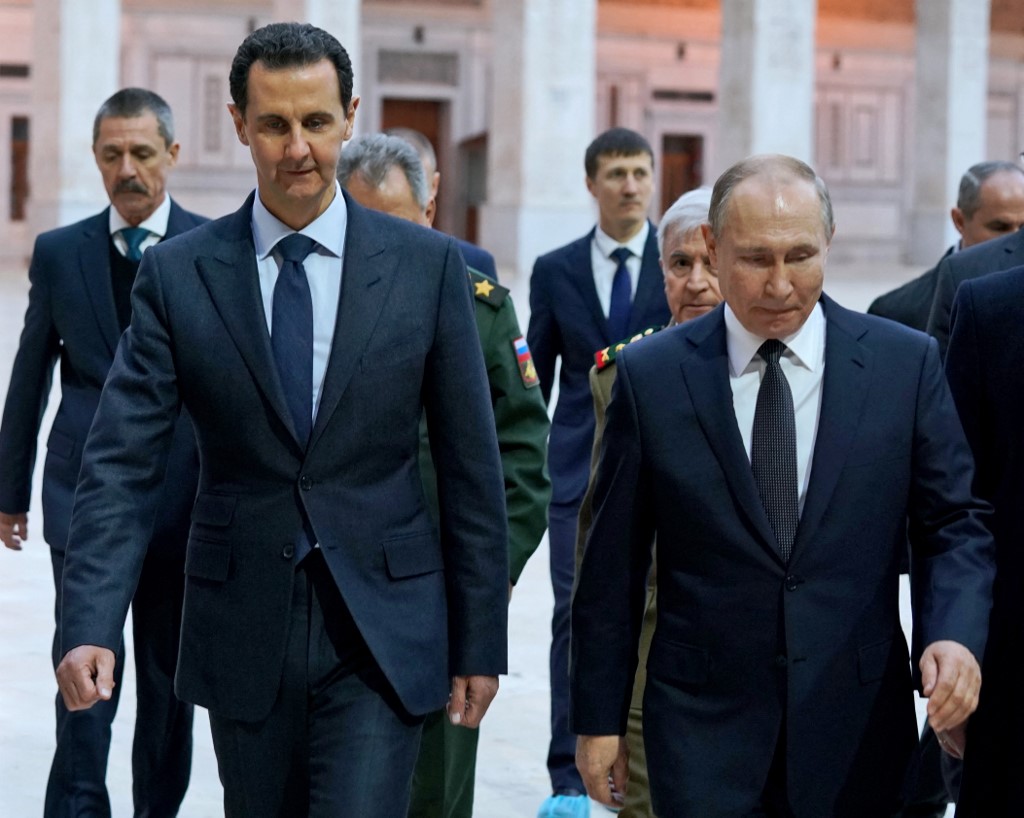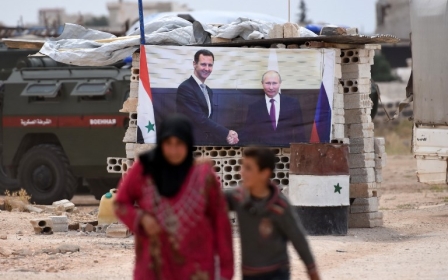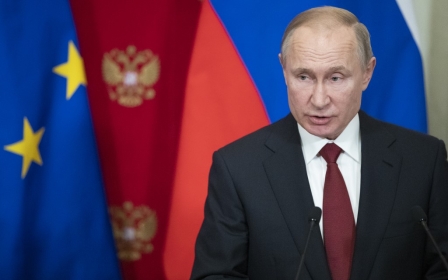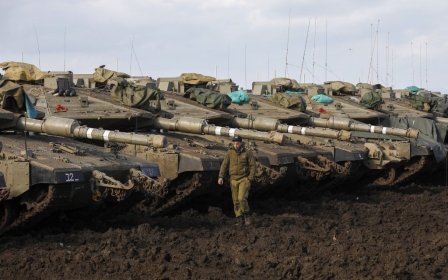Russia is a broker, not a peacemaker between Israel and Syria
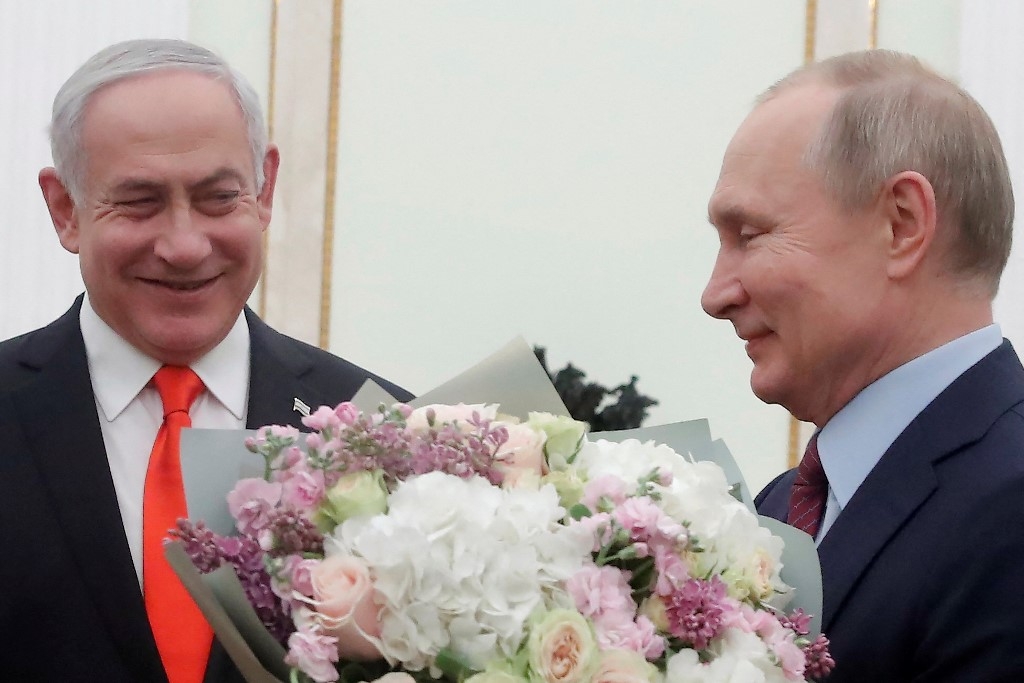
A series of Russian-mediated deals between Syria and Israel have recently caught the attention of analysts.
In December, Israeli and Syrian security chiefs reportedly met at Russia’s Syrian Khmeimim airbase, while Russian forces this month excavated a Palestinian cemetery in Damascus with the aim of recovering and repatriating the remains of several Israelis.
Also this month, Moscow brokered a deal that saw Damascus return an Israeli civilian in exchange for prisoners held in Israeli jails and, secretly, $1.2m worth of Russia’s coronavirus vaccines.
For two states technically at war, such regular contacts have been rare, prompting some to speculate that this might mark a more concerted Russian effort to mediate a peace deal. With Israel recently normalising ties with the UAE, Bahrain, Morocco and Sudan, could Syria, desperate for an end to international sanctions after a decade of civil war, be next on the list?
Fanciful schemes
New MEE newsletter: Jerusalem Dispatch
Sign up to get the latest insights and analysis on Israel-Palestine, alongside Turkey Unpacked and other MEE newsletters
The Times’ Roger Boyes posits that, however improbably, Putin may cast himself as a Middle Eastern peacemaker by engineering Iran’s ejection from Syria in exchange for Israel’s return of the occupied Golan Heights. But such schemes seem fanciful and misread the more likely Israeli, Syrian and Russian motives.
Israeli Prime Minister Benjamin Netanyahu’s reasons are probably more domestic than geostrategic. He faces yet another general election in March and likes to play the international statesman to boost his electoral appeal. Securing the return of a citizen and the remains of former soldiers, something particularly valued in Israel, could boost his popularity - and he has been keen to underline his “personal connections” with Russian President Vladimir Putin.
Moscow positions itself as the region's indispensable broker: the one external power that has relations with all the major players - Israel, Syria, Iran and even Hezbollah
This public closeness to Putin might also have other causes. Relations with the new Biden administration in the US are already strained, given Netanyahu’s closeness to former President Donald Trump and strained ties with former President Barack Obama. President Joe Biden conspicuously waited a month after his inauguration to call the Israeli leader. Publicly declaring Putin a friend and thanking him for his mediation sends a message to the White House that if it is going to be distant, there are other suitors.
Yet, this is still a long way from Israel accepting a Russian-mediated peace with Syria. Firstly, Israel must question whether Moscow could deliver such a peace. Israel would likely want the removal of all Iranian-allied forces, including Hezbollah, from Syria and Lebanon, which Moscow lacks the resources (and will) to achieve.
Secondly, it is questionable as to whether Israel really wants such a deal. The Golan has considerable strategic and economic value and, if anything, Israel is embedding itself deeper there, with the Trump administration recently recognising the annexation - something Biden has yet to rescind.
While Iran’s presence in Syria (and Lebanon) is threatening, it is something Israel has thus far contained via regular air strikes. While Netanyahu will continue to lobby Putin publicly to limit or even remove Iran’s presence in Syria, he likely prefers the status quo to losing the Golan.
Symbolic importance
Syrian President Bashar al-Assad also has little interest in a peace deal. While the Golan retains symbolic importance for his regime - his father, Hafez, was defence minister when it was captured - it is not worth the valuable alliance with Iran, which saved the embattled regime in the early years of the civil war.
While Russia is now the dominant external player in Syria, Assad still gains from Iran and its allied militias; in some areas, they are the dominant military force, while Assad also likes to play Tehran and Moscow off one another to get his way.
In addition, it is not clear as to whether peace with Israel would solve any of Damascus’ problems. It desperately needs money and investment, but a Russian-brokered Israeli peace would not unlock international funds the way a US-led one would, while the international community is unlikely to ignore Assad’s civil war brutality just because he reconciles with Netanyahu.
Politically, a peace deal with Israel would also be risky. Even if the Golan were returned, the Assad regime has long portrayed itself as a champion of Palestinian rights, which would be betrayed in any such peace, potentially prompting domestic unrest.
Assad’s acquiescence to the recent deals appears more the result of Russian pressure. While freeing Syrians from prison gives the regime something, digging up graves to recover Israeli soldiers is humiliating, especially if it includes Eli Cohen, the notorious spy publicly hanged in 1965 to nationalist fanfare.
The inclusion of much-needed Covid-19 vaccines might have sweetened the deal, but it still seems Damascus has been strong-armed by Moscow - and yet, Assad is not Putin’s puppet. Russia has been repeatedly frustrated by Assad’s stubbornness and unwillingness to make even minor concessions throughout the civil war.
It is possible that Assad’s acceptance of these deals is intended to placate Putin, while still refusing to budge on weightier issues, notably Syria’s stalled constitutional committee negotiations in Geneva.
Regional profile
So what of Russia’s motives? Rather than being a first step towards Syrian-Israeli peace negotiations, these deals represent continuity with Putin’s strategy towards the Levant since Russia directly entered the Syria conflict in 2015. Moscow positions itself as the region’s indispensable broker: the one external power that has relations with all the major players - Israel, Syria, Iran and even Hezbollah.
This has allowed it to boost its regional profile and influence at the expense of its retreating rival, the US. In any future clashes between Israel and Hezbollah, Iranian or Syrian forces in either Lebanon or Syria, the mediator will now likely be Russia, not the US.
Importantly, this has come at relatively little cost to Putin. Military hardware has been poured into Syria, but with only limited losses - as Iranian and Syrian troops do the brunt of the fighting - and most costs have been recouped or surpassed by consequent arms deals with other Middle Eastern militaries impressed with Russian kit. Indeed, even the recent Israel deal saw Netanyahu pay Russia for Syria’s Covid-19 vaccinations.
So why would Moscow want to change this and push for a permanent Syrian-Israeli peace? Such a peace would end its role as mediator, as Iran and Hezbollah would be ejected, and it would probably destroy Russia’s alliance with Tehran. It would also be costly, as Russia would have to ensure the compliance of both sides, which could mean deploying troops to hunt down any resistant pro-Iranian elements.
Moreover, if the peace was really successful, it might lead to Syria’s eventual international rehabilitation, lessening its dependence on Russia. All of this seems a lot to pay for little gain.
Mediating the current chaos serves Putin’s agenda far better than seeking to engineer and maintain a difficult peace, so Russia will likely remain the Levant’s broker, not its peacemaker, for the foreseeable future.
The views expressed in this article belong to the author and do not necessarily reflect the editorial policy of Middle East Eye.
Middle East Eye delivers independent and unrivalled coverage and analysis of the Middle East, North Africa and beyond. To learn more about republishing this content and the associated fees, please fill out this form. More about MEE can be found here.



